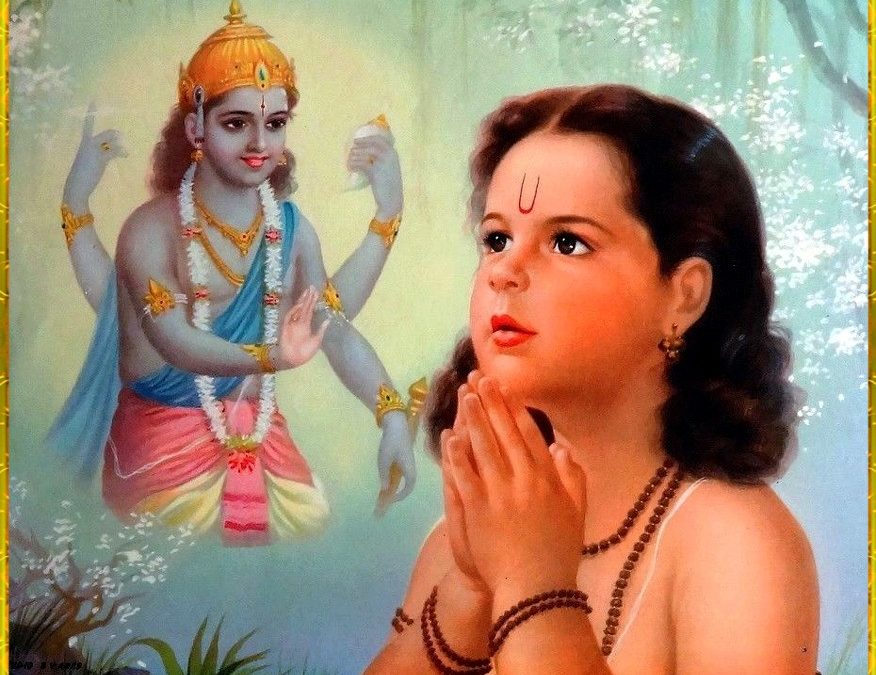Surrendering to the Divine
As human beings, every day we are looking for love and connection. We are searching to overcome our insecurities, our self-doubts, criticisms, and fears, and realizing that the love most of us seek on the outside already lies within us. There are many stories I could share with you from Hindu mythology to show that the love we search for is already inside us. One story which I recently shared with my students is special to me.
It is the story of the little boy Dhruva, which when you look up into the skies at night you will see the Northern Pole Star, the brightest one in the northern skies, dedicated to Dhruva.
I teach and guide my students daily by sharing ancient knowledge, wisdom, stories, and mantras to benefit them in their lives. A lot of these Hindu mythology stories and the deities I speak about have their own mantras which are associated with them. When I am researching and writing these blogs and articles.
I spend a lot of time chanting these mantras reconnecting to their power.
A particular mantra associated with this little boy Dhruva first came to me in a vision in the 1990s as I was on an international flight to London. I was sitting reading about a great saint. I closed my eyes to connect with this saint, suddenly I heard a loud thundering voice chanting a mantra to me. Each syllable of this mantra poured into my soul, it reverberated into every cell of my body. I will never forget this experience.
Recently during my research, I reconnected with the story of this little boy Dhurva and all the layers of the story, the life messages it holds. The same mantra which came to me in my vision while on the flight Dhruva also recited for Lord Vishnu to help him.
It is something which gives me so much comfort and warmth in my heart, I am pleased to share it with you all later in this blog. We can all connect and take something from this beautiful story of this little boy Dhruva seeking love on the outside instead of inside himself.
So, the story goes….
Once upon a time there was a little boy named Dhruva and he was the prince. His father was Uttānapāda, and he was the king of all the lands. Dhruva’s mother Suniti, was the king’s first wife, so Dhruva was the crown prince. He was the next in line to inherit the throne.
King Uttānapāda had another wife named Suruchi who was a beautiful-looking woman, but she was insecure and jealous. They had a son together named Uttama. Uttama who was younger than Dhruva was not in line to be the king, but Suruchi wanted her son to be king.
She constantly manipulated the king to withhold his affection from Dhruva, and this made Dhruva sad. One day Dhruva went to visit his father, Suruchi and Uttama are there. Uttama’s sitting on his father’s lap. Dhruva sees this, and he is a little sad and seeks his father’s love and connection. He approaches his father the king, and he asks, “can I come sit on your lap?” the father agreed, “of course my son”.
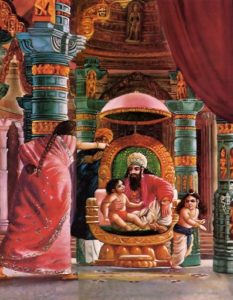 The king has both sons on his knees, Suruchi sees this, and she is furious. She comes over and she shoves Dhruva off the king’s lap and onto the floor. The king instinctively reaches for his son, but he looks up and sees Suruchi with an evil expression on her face. She tells Dhruva he does not deserve the king’s love, no one will ever love him, and no person could ever love him. Suruchi tells him the biggest problem is that he was not born from her womb, “you’re so unlovable, you need to go away and pray to Lord Vishnu. Pray, he’ll kill you and you request to be reborn again in my womb. At least then you would be my son.
The king has both sons on his knees, Suruchi sees this, and she is furious. She comes over and she shoves Dhruva off the king’s lap and onto the floor. The king instinctively reaches for his son, but he looks up and sees Suruchi with an evil expression on her face. She tells Dhruva he does not deserve the king’s love, no one will ever love him, and no person could ever love him. Suruchi tells him the biggest problem is that he was not born from her womb, “you’re so unlovable, you need to go away and pray to Lord Vishnu. Pray, he’ll kill you and you request to be reborn again in my womb. At least then you would be my son.
Only then will you be permitted to sit on your father’s lap. Only then will you deserve love.” Dhruva, this five-year-old little boy just wanted love and affection from his father. He instantly feels rejected, unloved, and unwanted by his father. In this story, Suruchi represents an evil stepmother archetype. What this represents in our lives is our insecurities and fears. It is our inner voice, our negative self-talk, our criticism, our doubts. It is this aspect which comes to pull us away from the affection of others.
When the king tries to help the boy, but he is unable this can be reflected in our own lives when others reach out to help us. We are sometimes so closed and insular from self-doubt and fear, even the divine has a hard time connecting with you.
We all have experienced in our own lives those negative voices in our head that are telling us, “Well, you’re not good enough, you’re not lovable enough”, this is Suruchi. She also does this to Dhruva telling him, “You are not worth loving.” For a little boy that is devastating, so he runs out of the room and he goes to find comfort with his birth mom, Suniti.
Suniti is a wonderful simple woman. She does not know how to console her son; she feels powerless. Dhruva is sobbing, saying, “Is no one ever going to love me? Am I not worthy of my father’s love? If my father does not love me then who could possibly love me? If no person can love me, then maybe God may love me. Perhaps my one salvation in life would be Vishnu. I pray that Vishnu will love me. Perhaps he will love me enough to do as Suruchi suggested and let me die so I could be reborn by her womb. Maybe then I’d be worthy of my father’s love.” Here we see the reaction of listening to those little voices inside of us, of self-doubt, criticism, fear, our instinct is to run away.
We believe perhaps this may fix our situation, that we may find the love or affection somewhere else or we hope someone else may give it and fill the vacuum.
Suniti told Dhruva, “the supreme Lord Vishnu is the real Father. He is the Father of all. His love is superior to attain than the from the King you call your father. Build a connection with Lord Vishnu, get to know him intimately. If you can do this, you will sit eternally in his lap. Dhruva took to heart what his mother said. He asks his mother, “How can I find Vishnu?”
Suniti informed him that the sages go to the forest to find God, to find the divine. Here we can also learn a lesson. We can see the strength of Suniti. She could accept her fate without hating it and could convince her son to accept the valuable instruction in Suruchi’s hateful words, without himself becoming a slave to hatred.
Dhruva starts on the path into the forest, where he meets a sage named Narada. He is a great devotee of Vishnu, a great spiritual teacher. Narada, when he sees this boy, asks what are you doing out here in the depths of the forest? This is not a safe place for you to be. Dhruva tells him he is here to find Lord Vishnu; I am here to find God. Narada tries to dissuade him as he knows it is unsafe and a strenuous task to survive out in the forest. Narada also recognises him and knows Dhruva’s family will be worried about him. Dhruva in tears told Narada his father does not love him. Dhruva keeps persisting and showing this determination, he will not give up. He is determined to find Lord Vishnu so he can sit on the throne again with his father.
You may ask what is the throne to a five-year-old? What is the treasure? It is his father’s love. A child does not feel like they have anything if they do not have their parent’s love. The throne itself represents love, that self-love, not even the love of the father.
To sit on the throne is to sit in the embodiment of love. Dhruva believes his only source of love will come from his father. Dhruva needs to find this. He believes Lord Vishnu will give it to him. He believes this will bring him full circle so he can receive the love of his father again.
Narada takes pity on the boy and gives him some practice and disciplines to do. Most importantly, he gives the boy two mantras. He says, “This is the name of the Lord that will bring you the blessings of Vishnu.” These mantras are:
“Om Namo Bhagavate Vasudevaya”
“Om Namo Narayana Namaha”
The latter one is the one which I was bestowed in my vision on an international flight which I mentioned earlier in this article. Dhruva went off into the forest and he started doing these intense Yogi practices and chanting these mantras continuously. Some Yogi’s associate a tree pose, Vrikshasana in Yoga Asana (Yoga position) with Dhruva because it is believed he stood on one foot doing these intense practices, reciting these mantras, committed, and determined to find God.
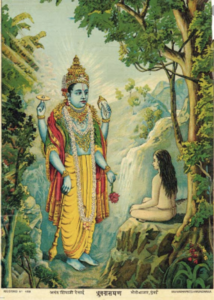
When the Gods witnessed these intense practices by Dhruva, they rushed to tell
Lord Vishnu. These intense practices had the earth shaking. Lord Vishnu agreed to go visit this little boy to see this for himself. Dhruva is immersed in meditation. He sees the image of Lord Vishnu inside himself, inside his own heart, and he is
completely fixed on that inner vision.
Lord Vishnu is standing in front of him with his brilliant, radiant light, and Dhruva keeps his eyes closed. He does not move nor acknowledge Lord Vishnu’s presence. Lord Vishnu takes his conch
shell, which is the seed of all sound and taps the boy with it to snap him out of his meditative state. The boy startles awake, and he looks at Vishnu and he does not
know what to do or to say.
The image he had been seeing on the inside for so long is now standing in front of him in the world. God is in front of him, in front of Dhruva’s physical body.
When Lord Vishnu awakens him, he says, “Little boy, you’re doing all these amazing practices and I see you’re so devoted to me. You are chanting my name. What is it I can do for you?” The little boy tells him his story, tells him what happened with his father and his love. Vishnu listens lovingly.
The boy says, “I want to sit on the throne. I want to sit on my father’s lap. I want his love again.” Vishnu consoles him. He says, “You have my blessings, you have my love. My blessing and my love are always with you and inside of you. Don’t worry, don’t worry about your father, I’ll make sure he loves you.” Vishnu tells him that not only will you have this love, but you will feel your father’s love and be able to sit on the throne, you will be king. You will have everything you wanted and more.
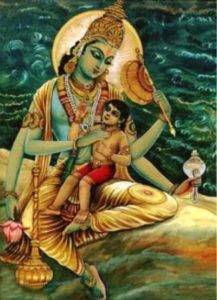 In fact, Lord Vishnu promises Dhruva a place in the sky. Dhruva will be the brightest star. He is the Pole star. Now, Pole star is our true north, which helps us find our way home.
In fact, Lord Vishnu promises Dhruva a place in the sky. Dhruva will be the brightest star. He is the Pole star. Now, Pole star is our true north, which helps us find our way home.
Even though the world is constantly spinning at the very centre of it all is that still point, which is the place of love. It is the centre of our very being. It is God’s love resting place. When Dhruva is getting the kingdom, he is getting the throne; it is in a way representing him stepping into society, stepping into his proper role in his community. The truth being is we cannot step into our role as a collective society, as a community, until we have found love inside of ourselves. If we are operating out of a place of fear, self- doubt, and criticism we are never open to that space of love, we exile ourselves from taking our true authentic place on the throne.
The reference to the throne does not mean being like a king or a queen, it means you are sitting in the royal place where you are guiding your own life. All it may take is a moment of looking inward, maybe chanting the mantras and finding the still place of love.
This will empower you to move through the world without getting knocked over by every insecurity you feel. Learning to let go and just accepting ourselves takes courage. By remembering you have God’s love inside of your heart will bring comfort and strength to you. When you love yourself, then you accept yourself. By accepting yourself then we are free to accept and love others.
To finish the story of Dhruva, he receives all these blessings from Vishnu for his vigorous efforts, devotion, and dedication.
Meanwhile, because God wished it so, Dhruva’s stepmother and father had already undergone a transformation of heart. He returns home. Upon hearing the news of Dhruva’s return, King Uttanapada rushed out of the palace to meet him. The king was accompanied by Suniti, Suruchi and Uttama. Without reservation, Dhruva honours both mothers by prostrating himself on the ground. Suruchi picked him up, “My dear boy, long may you live!” With tears of joy in her eyes she blessed him. Suniti then affectionately embraced Dhruva, as did his brother Uttama.
This historical story has a classical ending:
Dhruva grows in a happy, caring family and ultimately became a great monarch, loved by everyone in his kingdom—a kingdom greater than ever had existed. After many years Dhruva and his mother enter the region called Dhruva–Loka and lived there joyfully as the pole Star, the Dhruva Tara. This pole star is in our sky as a reminder for all of us that your true north, your fixed position is inside of you.
Growing up in a diverse culture like India, I was fortunate my young mind had often been titillated by stories of Deities, Gods, Saints, Sages, and mythological tales of righteous kings. For some, Indian mythology is equated to nothing but a tale as old as time, handed down generation after generation. However, looking at it closely, one realizes that our modern day lives can draw similarities and learn many life lessons from these mythological scriptures. By sharing this story of Dhruva one can see the impact of unrequited love by a parent at the incredibly young age of five, Dhruva’s longing to be loved by his father. We can relate this to modern day life as there are so many children who come from broken families, parents’ divorce, then they may remarry. It is important to ensure that our children receive love equally by both parents where possible.
We can see the impact it had on Dhruva in this story, the same impact happens in modern society where we can see this current generation suffering when parents’ relationship breaks down. They may suffer from increased anxiety, depression, and jealousy.
Dhruva is me, you, all of us….. we are that little boy looking inside for the love from the world and from our parents, from ourselves, and we will always find it by looking inward, by going inside to find God. It is important to note the Love for God is not for God alone. It does not diminish the affection we feel for others. It deepens affection because we can love others unconditionally and not look for anything in return. A devout who has developed his loving relationship with God, can see beyond others’ material conditioning, beyond their pleasant and unpleasant features, even beyond their cruelty, and relate to everyone as a unique spiritual person, part of God.
We strive to develop the intuition we admire in stories of great saints and spiritual teachers. When we feel safe in our own personal exchange of love with God, we will not crave others’ appreciation or feel hurt by their aggression. These qualities place us in a unique position to help others. Our love and devotion for God can make a difference in our families, friends, and even our enemies’ lives.
It is only through love we come to embrace the totality of the experience of life and the various challenges it presents. This story of Dhruva invites you to look inside your own heart, find the seed of love which dwells in all of us already.
When you find this seed of love, nurture and grow it. With this love awaken yourself and help awaken others.
End Note:
Lord Vishnu
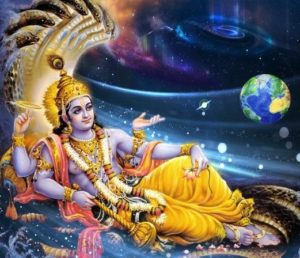
Lord Vishnu is God of Supreme. Vishnu is one of the three main Gods in Hinduism and the Absolute Supreme being in Vaishnava tradition. Vishnu is one of the Trimurtis* in Hinduism. Vishnu is the preserver god, which means he protects the universe from being destroyed and keeps it going, according to this religion, and he has come to earth in nine forms (called Avatars) so far, with one yet to come. His most famous forms are Rama and Krishna. Vishnu’s wife is Lakshmi, the Hindu goddess of fortune.
*The Trimūrti “three forms” is the triple deity of supreme divinity in Hinduism in which the cosmic functions of creation, maintenance, and destruction are personified as a triad of deities, typically Brahma the Creator (Generator), Vishnu the Preserver (Operator), and Shiva the Destroyer. “GOD”

